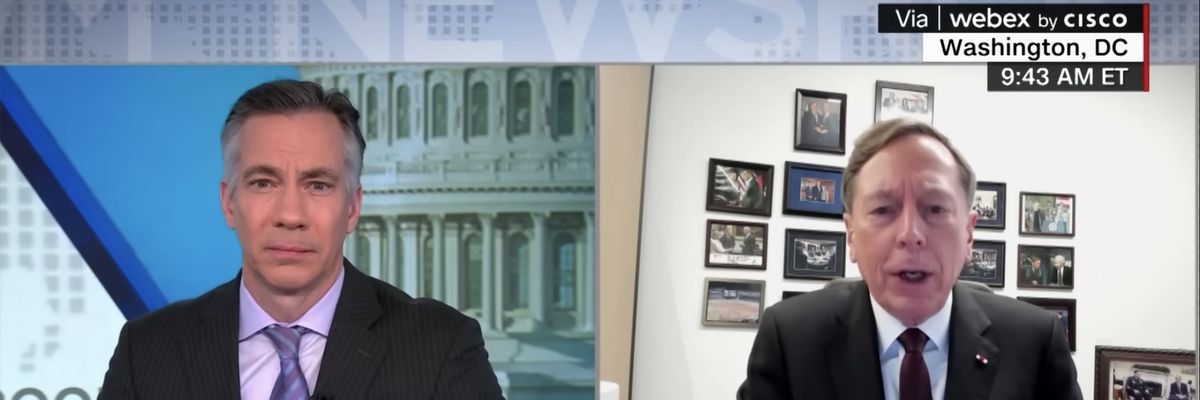The Washington Post reported recently that U.S. intelligence officials do not believe the Ukrainian military will achieve a key goal set out at the launch of its counteroffensive against Russian occupying forces back in June — reaching the southeastern city of Melitipol and cutting off Russia’s access to Crimea by land.
While the counteroffensive has achieved some recent successes — including piercing Moscow’s first line of multi-echeloned defensive positions and taking a key village — the Wall Street Journal reported last week that “there is no sign of a collapse in Russian lines.”
In fact, most recent mainstream reporting on the status of the offensive has been similarly dour, which might come as a surprise to anyone paying attention to predictions from the American pundit class shortly before the Ukrainian counteroffensive began.
Despite reports at the time quoting U.S. intelligence predicting that the upcoming Ukrainian offensive would result only in “modest territorial gains,” and fall “well short” of Kyiv’s goals, many lawmakers, experts, and pundits had a much more confident take. In fact, several senior officials openly suggested that the Ukrainian operations would be a rousing success, while others said it would lead to an all-out victory, expelling the Russians out of occupied Ukraine and perhaps even Crimea.
“I expect major gains in the coming days and weeks,” said Sen. Lindsey Graham (R-S.C.) — one of Ukraine’s most hyperbolic supporters — during a May 28 interview on Fox News. “I think they can expel Russia from Ukraine.”
The Russians are “in for a rude awakening” he said a couple days later. “In the coming days, you’re going to see a pretty impressive display of power by the Ukrainians.”
Indeed, Graham’s rosy assessments were just the tip of the overly optimistic grandstanding iceberg from that time. Here’s a brief — albeit not comprehensive — sample of what we heard about the upcoming counteroffensive last spring from not just expert pundits, but also top U.S. officials, despite their presumed knowledge of more sober U.S. intelligence predictions:
- Defense Secretary Lloyd Austin: “I think Ukraine will have a very good chance of success.” [03/28/23]
- National security adviser Jake Sullivan: “We believe that the Ukrainians will meet with success in this counteroffensive.” [06/04/23]
- NATO Secretary General Jens Stoltenberg: “I’m confident that when Ukraine decides to launch new operations to liberate more land, Ukraine will be successful.” [4/21/23]
- Former CIA Director, Gen. David Petraeus (ret.): "I personally think that this is going to be really quite successful. .. And [the Russians] are going to have to withdraw under pressure of this Ukrainian offensive, the most difficult possible tactical maneuver, and I don't think they're going to do well at that." [05/23/23] “I think that this counteroffensive is going to be very impressive.” [06/03/23]
- Retired U.S. Army Gen. Ben Hodges: “I actually expect, however, that [the Ukrainians] will be quite successful.” [05/12/23]
- Historian Edward Luttwak: “If Kyiv and the West are looking for the most plausible path to victory, this is it.” [05/11/23]
- Atlantic Council non-resident fellow Richard Hooker: “As we are often told, no plan survives contact with the enemy. There will likely be the occasional tactical miscue or operational hiccup during the coming counteroffensive, but a careful assessment suggests the odds are heavily in favor of Ukraine.” [05/23/23]
- Former Chief of the British General Staff, General Richard Dannatt: “[A]fter Kyiv's successful counteroffensive, Vladimir Putin ‘may be swept out of the Kremlin.’” [03/28/23]
- Paul Massaro, senior policy adviser, the Commission on Security and Cooperation in Europe: “Full Ukrainian victory is coming. Sooner than you think.” [06/12/23]
It’s hard to square these hopeful, borderline fanciful analyses with what we knew at that time. In fact, there were plenty of other experts offering more balanced forecasts of what was to come with Ukraine’s counteroffensive.
For example, the Quincy Institute’s George Beebe wrote back in April that available evidence at that time “paint[s] a much bleaker picture of Kyiv’s prospects in the war than the White House has acknowledged.” He added that that evidence depicts “manning and training levels for Ukraine’s much anticipated counter-offensive that inspire little confidence it will produce a decisive breakthrough against reinforced Russian defenses.”
Good policy requires good information, particularly when it comes to war and peace. Unfortunately, the commentariat in U.S. media and beyond hasn’t been providing very informed analysis when it comes to the war in Ukraine.
Analysts should separate what they might want to happen with what — from a more objective point of view — is more likely to actually happen. Too often, experts are offering rosy predictions of Ukrainian military operations where most available evidence suggests otherwise.
And as these unfounded optimistic predictions pile up, so too does American support both among the public and policymakers to pour more weapons and money into — what should look like to anyone taking a sober look at realities on the ground — a protracted stalemate or perhaps worse.
Joint Chiefs Chairman Gen. Mike Milley was shouted down last November when he suggested that perhaps Ukraine and its Western allies had a decent window of opportunity to negotiate an end to the war. While he has said more recently that it’s too early to assess whether the Ukrainian counteroffensive has been a success (albeit without defining success), he also maintained that kicking all Russian forces out of Ukraine via solely military means “is going to be very, very difficult and challenging.”
“A different way of going at it is through negotiations,” he said last week. “And maybe that’ll happen too.”
But if more objective assessments of the war in Ukraine continue to be drowned out by this same kind of emotion-based, wishful-thinking commentary and analysis, maybe it won’t.















